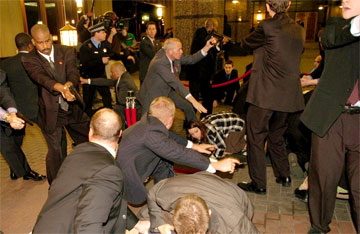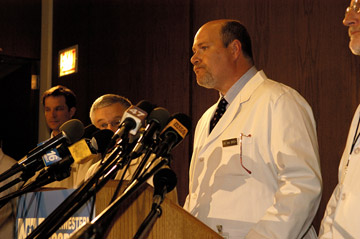Death of a President


Death of a President caused a sensation when it debuted at the Toronto Film Festival. After all, it is about the fictional assassination of President George W. Bush in October, 2007. The premise is a bit interesting, but the entire thing is more of a stunt than anything else. Death of a President is simplistic, and worse, BORING. If this is some attempt at political commentary, it has a long way to go because it doesn't make any meaningful comments. In the fictional world of 2007 created by writer/director Gabriel Range and co-writer Simon Finch, the United States still has a presence in Iraq, and the public's reaction is just as bad, if not worse, than it is right now.
The mechanics behind the film are a bit interesting. Range and Finch use extensive footage to create a sense of realism. Sometimes too much. The beginning of the film shows far too much of a speech given by Bush. Later, they combine actual speeches with a few choice word replacements so that what certain people are saying matches the plot of the film. Death of a President plays like the standard documentary after the fact. In chronological fashion, talking heads relate the fateful events in Chicago and their roles in the investigation. Some of the choices that Range and Finch made helped to doom this movie. They focus too much on what was happening before, rather than what happened afterwards. They skip nearly ten days of the investigation when nothing happens. Worse, they try to add twists and turns like a normal film, not remembering this is a fake documentary, and that any red herring would not be given as much attention after the fact.
The actual shooting itself was given far too much hype. An actor stood in for Bush, then Bush's face was digitized onto the actor's head. As Bush emerged from a meeting, shots fire from a crowd, and everything erupts in chaos. The cameras are all over the place, and everything is a blur. That's about all. The rest of the film shows where the filmmaker's political beliefs truly lie. It is not wrong to be liberal or conservative, or to make a film that skews one way or the other. During Bush's reelection campaign, liberal filmmakers came out in droves to make films against Iraq or Bush (with mostly varying results). It is wrong to make a film that criticizes the administration, but doesn't do anything other than kill the President. In the aftermath of Bush's death, Cheney becomes President. The United States hunts for the assassin with fervor, and the government enacts Patriot III, a successor to the Patriot Act that gives the government even more power to investigate its own people. A Middle Eastern suspect emerges, and filmmakers use a clever twist on current events to make his guilt seem genuine. But everything that follows becomes a bit ridiculous.
Is all of this plausible? Probably. But it waters down extremely complex ideas into a story that doesn't really go anywhere. It's hard to believe that a liberal activist would cheer at the death of Bush, no matter how much he disagreed with Bush's policies. It's hard to imagine, even given the circumstances, that the government would pass Patriot III, especially given the uproar now over the Patriot Act. An entirely different argument is how moral a film like this is. Is it right to depict the assassination of the actual sitting President? Well, if they used a fictional one, this film would still be looking for a distributor. And in the wake of Toronto, major film chains like Regal and Cinemark announced that they would not show Death of a President in their theaters. It's a mistake to ban this film just because of its controversial content, especially since both chains make it a point to reserve screens for art house far. It is a good choice not to screen this because of financial reasons - conservatives will find this morally repugnant, and liberals will find this boring.